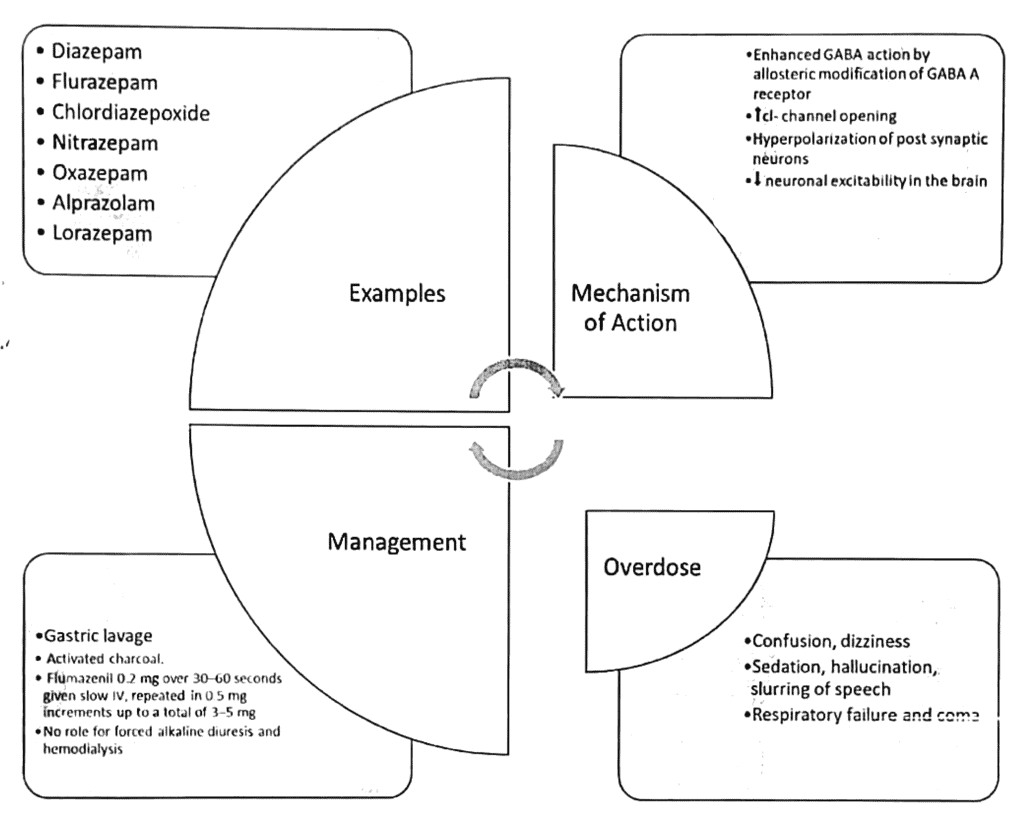UPSC Exam > UPSC Notes > Medical Science Optional Notes for UPSC > Barbiturate/BZD Poisoning, Lathyrism
Barbiturate/BZD Poisoning, Lathyrism | Medical Science Optional Notes for UPSC PDF Download
Barbiturate/BZD Poisoning

Barbiturate Poisoning

Benzodiazepine Poisoning

Question for Barbiturate/BZD Poisoning, LathyrismTry yourself: Which of the following symptoms is commonly associated with barbiturate poisoning?View Solution
Barbiturate/BZD Poisoning-Repeats
Q1: Discuss in detail the general principles of treatment of barbiturate poisoning (1994).
Q2: Describe the signs, symptoms and treatment of acute barbiturate poisoning (2005).
Q3: Discuss the physiological action, clinical features and post-mortem findings in a case of death due to alprazolam poisoning. (2016)
Lathyrism


Question for Barbiturate/BZD Poisoning, LathyrismTry yourself: Which of the following is a general principle of treatment for barbiturate poisoning?View Solution
Lathyrism-Repeats
Q. What are the signs and symptoms of Lathyrism? Discuss them very briefly (2006).
The document Barbiturate/BZD Poisoning, Lathyrism | Medical Science Optional Notes for UPSC is a part of the UPSC Course Medical Science Optional Notes for UPSC.
All you need of UPSC at this link: UPSC
|
7 videos|219 docs
|
FAQs on Barbiturate/BZD Poisoning, Lathyrism - Medical Science Optional Notes for UPSC
| 1. What are the common symptoms of barbiturate/BZD poisoning? |  |
Ans. Common symptoms of barbiturate/BZD poisoning include drowsiness, confusion, slurred speech, impaired coordination, slow breathing, and in severe cases, coma or death.
| 2. How can barbiturate/BZD poisoning be treated? |  |
Ans. Treatment for barbiturate/BZD poisoning involves supportive care, such as maintaining a clear airway, providing oxygen, and ensuring proper ventilation. Activated charcoal may be administered to help absorb the poison. In severe cases, medical professionals may use specific antidotes or perform gastric lavage to remove the substance from the stomach.
| 3. What is lathyrism and how is it related to the given topic? |  |
Ans. Lathyrism is a neurological disorder caused by the consumption of the legume Lathyrus sativus, commonly known as grass pea. It is not directly related to barbiturate/BZD poisoning.
| 4. Can barbiturate/BZD poisoning be fatal? |  |
Ans. Yes, barbiturate/BZD poisoning can be fatal, especially in cases of overdose or when combined with other substances, such as alcohol. Prompt medical attention is essential in such cases.
| 5. Are barbiturates and benzodiazepines the same? |  |
Ans. No, barbiturates and benzodiazepines are different classes of drugs. While both depress the central nervous system, they have different chemical structures and mechanisms of action. However, they are both associated with the risk of poisoning if misused or taken in excessive amounts.
Related Searches

















